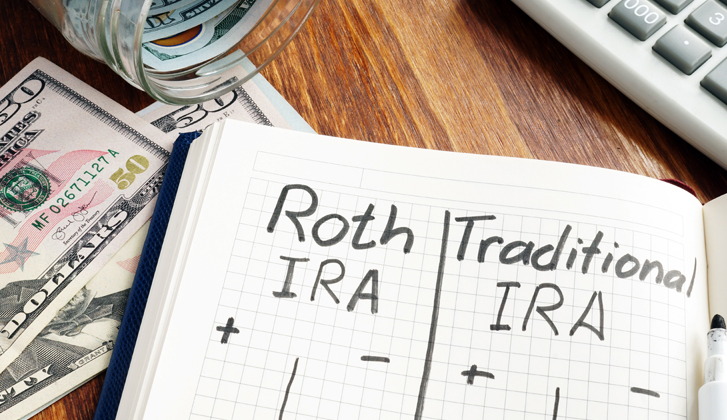NOTICE: Internet Explorer was retired by Microsoft on June 15th, 2022 and is no longer supported. This could change how you access Online Banking.
401(k) Retirement Planning: Decoding the Basics

Retirement investments may not be at the top of every young professional’s to-do list, but it’s an essential part of staying financially stable throughout your life. Maybe you’re interested in how these investment accounts work, are researching the best options for your life stage, or you just started a new job that offers a 401(k) plan. Sure, you may be having fun in the sun today, but saving a little along the way will allow you to keep the good times rolling farther down the road. Let’s break down 401(k) retirement planning and how to get started.
What is a 401(k) and How Does it Work?
A 401(k) plan is usually offered by employers to make sure their employees have access to a dedicated retirement investments plan. When you opt into your company’s 401(k) plan, you choose how much to contribute to the plan each month, and money is deducted automatically from your paycheck. 401(k) accounts are made up of investments like stocks, bonds or mutual funds. Often you can choose from a set of funds provided by your plan based on risk level. So, depending on how you customize your plan, be prepared for your 401(k) balance to fluctuate with the market.
When it comes to 401(k) 101 knowledge, it’s important to note the tax benefits that come with your contributions. Contributions to your 401(k) account are pre-tax. That means you don’t pay taxes on the money until you withdraw it from the account. Your contributions are not counted as income, so you could lower your taxable income by contributing, reducing your tax bill now as you save for the future. The more you’re able to contribute up to the max for your income, the lower your current tax burden may be.
Employer 401(k) contributions
If you opt for 401(k) retirement planning with your employer, they may also offer a 401(k) match up to a percentage of your salary. It’s time to break out into a happy dance if this is the case. A 401(k) match is when your employer matches your yearly contributions to a degree. It’s up to the employer to decide how much they match, but the more you contribute, the more your company can match until you reach their 401(k) max contribution. For example, many employers will match 50% of your contribution up to 6% of your salary. You can always contribute a higher percentage of your salary to the 401(k), but it will not be matched. The bottom line? Always contribute enough to get your max match.
Unfortunately, you can’t contribute an unlimited amount of money to a 401(k) account. Your employer may put a max on their match contributions, but the IRS also puts a 401(k) max on annual contributions, which changes every year. Remember that if you have an employer offered 401(k) plan, they may have a lower 401(k) max for what they will match.
How Much Should I Contribute to My 401(k) Retirement Planning Account?
For many young professionals getting started with 401(k) retirement planning, the question regarding contributions is usually top of mind. A general rule of thumb for young investors is to contribute 10%-20% of your gross income to the account. If your company offers a 401(k) match, make sure you attempt to reach their 401(k) max. For investors who are over 50, the IRS also offers a catch-up contribution allowance in addition to their set 401(k) max.
What Happens if I Change Employers?
Chances are, you will change employers a few times in your life, which could lead to multiple 401(k) accounts. The best solve for this is choosing a 401(k) rollover. A 401(k) rollover transfers your funds from one employer account into an individual retirement account, commonly known as an IRA. You also have the option to transfer the balance of an old 401(k) to the 401(k) plan with your new employer.
However, it’s never a good idea to cash out a 401(k) account before you reach retirement age. When you cash out a 401(k), you’re going to be taking on some serious penalties like paying taxes on the withdrawable funds along with facing withholding fees.
Not sure what to do? Many employers will allow you to keep your 401(k) after you no longer work for them, so you have some time to figure things out. Just make sure you’re aware of any fees your previous employer may have been paying that could now come out of your account balance. Plus, rolling the old account to an IRA or current 401(k) gives you greater control over your funds.
The Difference Between a Traditional IRA and 401(k)
Retirement investment accounts can get confusing, but you shouldn’t have to stress over which account is right for you. The main difference between a traditional IRA and 401(k) is who offers the account. 401(k) accounts are offered by employers and a traditional IRA is an account you would open yourself at a local bank. Let’s break down each account in more detail:
401(k) vs. IRA
401(k) |
Traditional IRA |
|---|---|
|
|
*Review current tax and distribution requirements if you’re approaching distribution age.
So, when it comes to a 401(k) vs. IRA, which one is right for you? An IRA is a great option to rollover a 401(k), but you may end up maxing it out depending on the contribution limits. Actually, IRAs are a nice complimentary account to an employer-offered 401(k). It’s always a good idea to take advantage of an employer offered 401(k) and the match they offer, too. Remember, when it comes to retirement accounts you can have more than one. Diversifying your retirement portfolio is an ideal strategic approach.
WesBanco’s Retirement Investments*
If you’re looking for a retirement account partner, WesBanco’s retirement benefits team has an average of 23 years’ trusted experience in planning for the future. We offer a variety of retirement investments, including 401(k) rollover plans, Traditional IRAs, Roth IRAs and more. Opening these accounts and rolling over funds is simple with your specialist by your side.
As a retirement investments client, your dedicated specialist will provide you with a personalized approach to growing your nest egg, so you can cross off bucket list items once you put in the hard work.
*IRAs and 401(k) plans may be invested in insured deposits or non-deposit investment products. Non-deposit investment products are not insured by the FDIC, are not deposits or other obligations of, or guaranteed by any bank or any affiliate, and are subject to investment risks including the possible loss of the principal amount investment.
Explore Retirement Planning Options
Content is for informational purposes only and is not intended to provide legal or financial advice. The views and opinions expressed do not necessarily represent the views and opinions of WesBanco.



